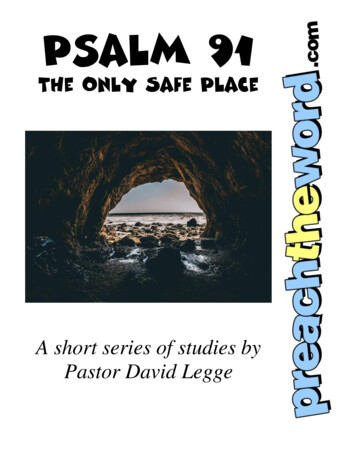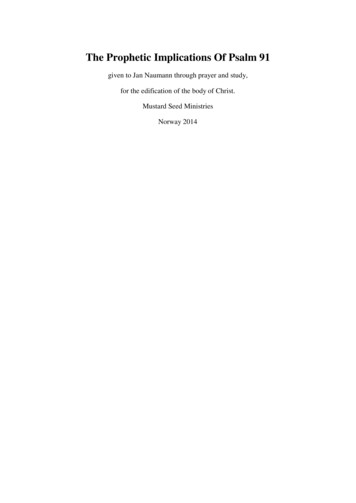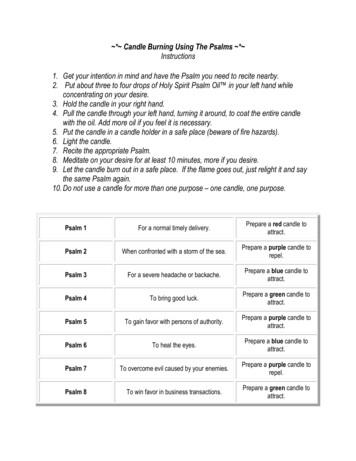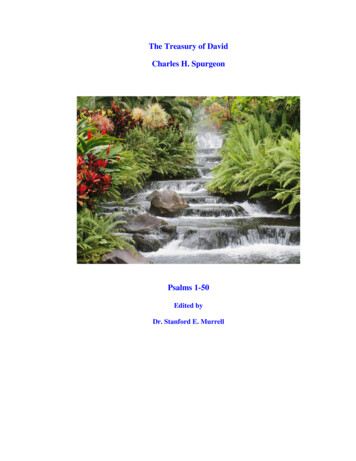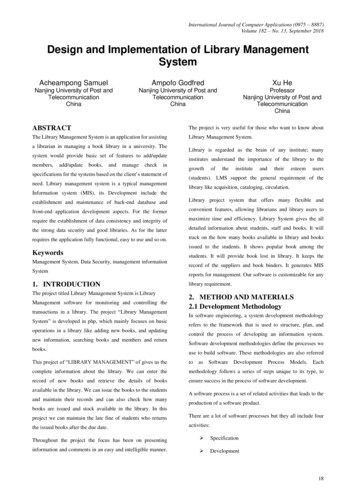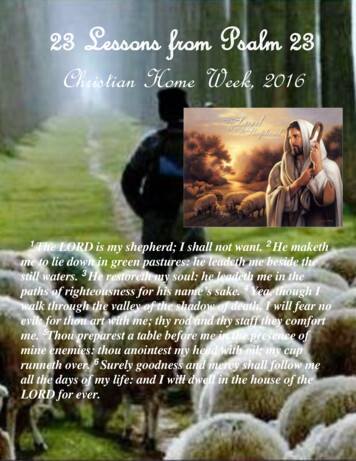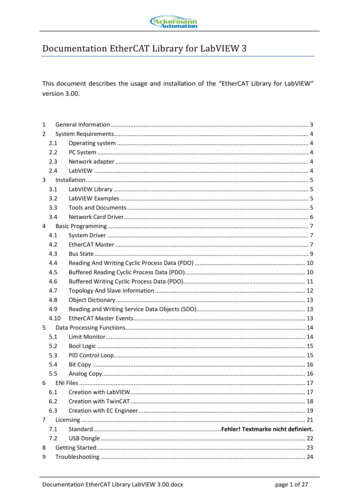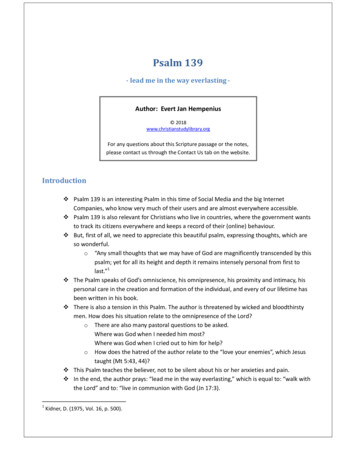
Transcription
Psalm 139- lead me in the way everlasting -Author: Evert Jan Hempenius 2018www.christianstudylibrary.orgFor any questions about this Scripture passage or the notes,please contact us through the Contact Us tab on the website.Introduction Psalm 139 is an interesting Psalm in this time of Social Media and the big InternetCompanies, who know very much of their users and are almost everywhere accessible. Psalm 139 is also relevant for Christians who live in countries, where the government wantsto track its citizens everywhere and keeps a record of their (online) behaviour. But, first of all, we need to appreciate this beautiful psalm, expressing thoughts, which areso wonderful.o “Any small thoughts that we may have of God are magnificently transcended by thispsalm; yet for all its height and depth it remains intensely personal from first tolast.”1 The Psalm speaks of God’s omniscience, his omnipresence, his proximity and intimacy, hispersonal care in the creation and formation of the individual, and every of our lifetime hasbeen written in his book. There is also a tension in this Psalm. The author is threatened by wicked and bloodthirstymen. How does his situation relate to the omnipresence of the Lord?o There are also many pastoral questions to be asked.Where was God when I needed him most?Where was God when I cried out to him for help?o How does the hatred of the author relate to the “love your enemies”, which Jesustaught (Mt 5:43, 44)? This Psalm teaches the believer, not to be silent about his or her anxieties and pain. In the end, the author prays: “lead me in the way everlasting,” which is equal to: “walk withthe Lord” and to: “live in communion with God (Jn 17:3).1Kidner, D. (1975, Vol. 16, p. 500).
The context, form and structure, theological, technical and hermeneutical notes given in thissermon outline overlap with other sermon outlines taken from the Book of Psalms. Thismakes it possible to use this sermon outline as a “stand-alone”. You can also fit this outlineinto a series of sermons.Context The historical context of Psalm 139 is not known. The only inference to personalcircumstances is found in verse 19-22, where the poet points to the wicked, who are theenemies of God and his enemies. The Book of Psalms belongs to the Wisdom literature. Psalm 139 is part of the fifth book ofPsalms (Psalm 107-150).Form and structure Psalm 139 is beautifully construed. the Psalm 139 consists of two parts and four stanzas.2ooThe first part (verse 1-18) acclaims God’s sovereignty, his knowledge and hiswonderful works. There are three stanzas, addressing three themes: God’s Personal Knowledge; God’s Personal Presence; God’s Personal Care.The second part (verse19-24) consists of one stanza. Each of the four stanzas consists of two parts, one of four verses, and one of two verses. Seebelow.Superscript:For the director of music. Of David. A Psalm.Part 1 (verse 1-18). Acclamation and Praises.2Stanza. (2018, July 27). Retrieved from https://en.wikipedia.org/wiki/Stanza
God’s Personal Knowledge(verse 1-6)God’s Personal Presence(verse 7-12)1O LORD, you have searched meand you know me.2You know when I sit and when I rise;you perceive my thoughts from afar.3You discern my going out and my lying down;you are familiar with all my ways.4Before a word is on my tongueyou know it completely, O LORD.5You hem me in—behind and before;you have laid your hand upon me.6Such knowledge is too wonderful for me,too lofty for me to attain.7Where can I go from your Spirit?Where can I flee from your presence?8If I go up to the heavens, you are there;if I make my bed in the depths, you are there.9If I rise on the wings of the dawn,if I settle on the far side of the sea,10even there your hand will guide me,your right hand will hold me fast.11If I say, “Surely the darkness will hide meand the light become night around me,”12even the darkness will not be dark to you;the night will shine like the day,for darkness is as light to you.
God’s Personal Care(verse 13-18)13For you created my inmost being;you knit me together in my mother’s womb.14I praise you because I am fearfully and wonderfully made;your works are wonderful,I know that full well.15My frame was not hidden from youwhen I was made in the secret place.When I was woven together in the depths of the earth,your eyes saw my unformed body.16All the days ordained for mewere written in your bookbefore one of them came to be.17How precious to me are your thoughts, O God!How vast is the sum of them!18Were I to count them,they would outnumber the grains of sand.When I awake,I am still with you.Part 2 (verse 19-24). Prayer request.Personal outcry andprayer request(verse 19-24)19If only you would slay the wicked, O God!Away from me, you bloodthirsty men!20They speak of you with evil intent;your adversaries misuse your name.21Do I not hate those who hate you, O LORD,and abhor those who rise up against you?22I have nothing but hatred for them;I count them my enemies.23Search me, O God, and know my heart;test me and know my anxious thoughts.24See if there is any offensive way in me,and lead me in the way everlasting.
Technical, hermeneutical and historical notesRemark Some difficulties with regard to the translation of the Hebrew text will not be addressed.Parallellismus membrorum Parallellismus membrorum is a special feature of Biblical literature, especially of the OldTestament Wisdom Literature, i.e. The Book of Job, Psalms and Proverbs. It “is also present,although less prominent, in biblical prose. It can be defined as the repetition of the same orrelated semantic content and/or grammatical structure in consecutive lines or verses.”3 It isvery helpful to discover the beauty and the wisdom of the Psalms. There are three kinds of parallelism:oSynonymous parallelism. oTwo (three) lines express the same thought. Verse 13 is an example: For you created my inmost being; you knit me together in my mother’s womb.The two lines can complement each other, such as the lines of verse 9: If I rise on the wings of the dawn, (The East) if I settle on the far side of the sea, (The West)Syntactical parallelism The third and the fourth line complete the first two lines (verse 9, 10):1.2.3.4. oA special case is “the concluding form” (verse 14): I praise you because I am fearfully and wonderfully made; your works are wonderful, I know that full well.Antithetical parallelism 3If I rise on the wings of the dawn, (verse 9)if I settle on the far side of the sea,even there your hand will guide me, (verse 10)your right hand will hold me fast.An example is found in Psalm 139:24:See for more information: Berlin, A. (1992). Parallelism. In D. N. Freedman (Ed.)(Vol. 5, p. 155).
See if there is any offensive way in me, and lead me in the way everlasting.Chiasm A chiasm is also found in this Psalm. This means that the same thought is repeated but inreversed order (verse 15, 16):ooMy frame was not hidden from you (A) when I was made in the secret place. (B) When I was woven together in the depths of the earth, (B)your eyes saw my unformed body. (A)Verse 1, 23 to search “ ”חקר : to explore, search out; to question somebody (about his basicconvictions).4oIn verse 1, the verb is used in the perfect tense.oIn verse 23, the verb is used in the imperative mode. To know “ ”י ָדַ ע : 2 b); of God’s knowing persons, etc., thoroughly; knowing the heart.5ExpositionPreliminary Remarks The Psalm refers to the LORD, the NAME of God, which he has made known to Moses (Ex3:13, 14) and in Jesus Chris. “I AM” (present). The key to the right understanding of this Psalm is found in verse 23:o Search me, O God, and know my heart;test me and know my anxious thoughts.o These anxious thoughts have led the author to his personal outcry of verse 18-22. He is endangered and threatened by bloodthirsty men who abuse the nameof the LORD. They are the enemies of the LORD and his enemies.o These anxious thoughts also gave rise to the statement of faith and the praise ofGod’s wonderful works in the first part.4Koehler, L., Baumgartner, W., Richardson, M. E. J., & Stamm, J. J. (1994–2000, p. 348).5Brown, F., Driver, S. R., & Briggs, C. A. (1977, p. 394).
oThe Psalm begins with a statement of faith trusting God’s Personal Knowledge, hisPersonal Presence and the Personal Care, which is followed by this outcry due toanxieties, which gave rise to his personal prayer. This has been visualised below.Verse 1a “Of David.” This doesn’t imply that King David was the original author, which is possible butnot conclusive. It can also mean: this Psalm belongs to the collection of David.Part 1 (verse 1b-18)Verse 1b-6 God’s Personal Knowledge (first stanza) - omniscience Verse 1-4o“You searched me.” Searching means probing the thoughts and feelings, themotives and the integrity of the author. Jesus searched the motives of the Pharisees when he said: “Woe to you,teachers of the law and Pharisees, you hypocrites! You clean the outside ofthe cup and dish, but inside they are full of greed and self-indulgence. BlindPharisee! First clean the inside of the cup and dish, and then the outsidealso will be clean” (Mt 23:25, 26). The author is not afraid that God noticed any sinful thoughts and feelings.He knows the LORD, his God. Compare Psalm 103:“The Lord is compassionate and gracious,slow to anger, abounding in love.He will not always accuse,nor will he harbour his anger forever;he does not treat us as our sins deserveor repay us according to our iniquities.
For as high as the heavens are above the earth,so great is his love for those who fear him;as far as the east is from the west,so far has he removed our transgressions from us.As a father has compassion on his children,so the Lord has compassion on those who fear him;for he knows how we are formed,he remembers that we are dust” (Ps 103:8-14).o“You perceive my thoughts from afar.” “Perceive” “ ”בין : 2. to pay attention to, to consider, to think about (Dt32:29; Ps 73:17; Ps 139:2).6 oIt is important to notice that God is not taking over and controlling ourthoughts. He has created us as individuals and responsible beings. He iswatching us like a father or mother who is watching his child. A father mightwonder, what his child might be thinking but God knows.“You discern my going out and my lying down.” “Discern” “ ”ז ָָרה : know, discern, formally, measure off, gauge, i.e., haveclear knowledge of a person.7o“you are familiar with all my ways.” “Way” “ ”דֶּ ֶּרְך : manner, custom, behaviour.8 The Lord is familiar with yourlifestyle, and your circumstances. “You are familiar with suggests thepsalmist welcomes this knowledge.”9 This knowledge is personal knowledge, not rational but empathetic knowledge like ahusband knows his wife, a girl-friend her boyfriend. It is knowledge based on love. Verse 5, 6o“You hem me in.” The LORD is a God of proximity and intimacy. But also a God,whom I cannot escape (see verse 7-12).o“Such knowledge is too wonderful for me, too lofty for me to attain.”6Koehler, L., Baumgartner, W., Richardson, M. E. J., & Stamm, J. J. (1994–2000, p. 122).7Swanson, J. (1997).8Koehler, L., Baumgartner, W., Richardson, M. E. J., & Stamm, J. J. (1994–2000, p. 232).9Waltke, B. K., Houston, J. M., & Moore, E. (2010, p. 548).
“The Lord discerns the actions of his own (verse 1), whether they sit orstand (verse 2; see Ps 1:6). This discernment belongs uniquely to God, whoalone is the Judge of all flesh. Hence the psalmist exclaims that this divineprerogative is beyond him: ‘Such knowledge is too wonderful for me.’”10Verse 7-12 God’s Personal Presence (second stanza) - omnipresence Verse 7-10o “Where can I go from your Spirit? Where can I flee from your presence?” Theanswer will be a simple nowhere.o “If I go up to the heavens, you are there.” The writer used vivid imagery. Mancannot go up to the heavens, but he can still climb a high mountain. God will bethere.o “if I make my bed in the depths, you are there.” He used the Hebrew word which isalso used for the realm of the dead. The writer doesn’t want to die but again heused vivid imagery when he wants to take his refuge into a deep cave, deep into theearth.o “If I rise on the wings of the dawn.” Rise up early in the morning. The sun has notrisen yet, a new day is dawning. Look at the east. The orange colours are like wingsspreading over the horizon.o “If I settle on the far side of the sea.” The sea is west of Israel. The prophet Jonahwanted to travel to the far west to flee the presence of God. He could not (Jonah1:1-17).o “Even there your hand will guide me, your right hand will hold me fast.” “For I am the LORD, your God,who takes hold of your right handand says to you, Do not fear;I will help you” (Isa 41:13). Verse 11, 12o “If I say, “Surely the darkness will hide me the night will shine like the day, ” Inthose days it could be pretty dark during the nights.Verse 13-18 God’s Personal Care (third stanza) Verse 13-16o In this part of the Psalm, we get to know God as Father, here with tender motherlycare, although weaving and embroidery were done by man.10VanGemeren, W. A. (2008, Vol. 5, p. 960).
“The stanza represents God as a skilful weaver of embroidered clothdedicated to creating his magnum opus. His studio is the dark chamber of amother’s womb.”11o “For you created my inmost being.” The “inmost being” refers to the kidneys, theseat of feelings like anxiety (verse 24).o “The secret place” and “the depths of the earth” are images for the womb of themother, hidden from the sight of ordinary people, God was at work. God’s eyes wereupon him.o He is looking at the past of his creation and also to the future. Every day has beencounted by God and been written in his book. Job said (Job 10:9-12):“Remember that you moulded me like clay.Will you now turn me to dust again?Did you not pour me out like milkand curdle me like cheese,clothe me with skin and fleshand knit me together with bones and sinews?You gave me life and showed me kindness,and in your providence watched over my spirit. Verse 17, 18o The author bursts out in praises and in confidence. “When I awake, I am still withyou.”Part 2 (verse 19-24)Verse 19-24 anxieties and personal prayer (fourth stanza) Verse 19-22o The author is threatened by enemies, who are bloodthirsty, abusing the name of theLord and speak against the Lord.o“Do I not hate those who hate you, O LORD?” Compare this with the words ofJesus.“You have heard that it was said, ‘Love your neighbour and hate your enemy.’ But Itell you: Love your enemies and pray for those who persecute you” (Mt 5:43, 44).Does Jesus contradict Psalm 139?During the days of Jesus, the Pharisees taught the people: “Love your neighbour andhate your enemy.” The enemy were the Romans, and their neighbours the fellowJews. In the Old Testament, there is not such a command found to hate your enemy.11Waltke, B. K., Houston, J. M., & Moore, E. (2010, p. 557).
Although it is not stated explicitly, the Pharisees might have quoted Psalm 139:21,22 to support their argument or use it as an example.If that was the case, it was not taken into account that the author was speakingabout his anxieties, and cried out for help to lead him in the way everlasting.When applied to the words of Jesus, his word to love your enemies is part of theway everlasting.oTension (see above): When God is everywhere, in the heavens above, the earth beneath, the eastand the west, one might ask why he did allow the wicked to approach andthreaten the author, and to speak evil words of God?o Why does this Psalm express such a hatred? Firstly, the Psalm shows us a “natural” response. The author really feelsanger, resistance, and hatred. He wants to defend the honour and glory ofthe NAME of the LORD. Secondly, the Psalm teaches us to give air to these feelings. Otherwise, wewill resemble a pressure-cooker, and if the steam will not be released, thecooker might explode with much damage. Thirdly, the Psalm explains that while giving air to these feelings andanxieties, there will be room for prayer to God. Verse 23-24o Because of the preceding verses (1-22) about God’s personal knowledge, presence,care, and the present situation being threatened, the author concludes thisbeautiful Psalm with prayer: search me, know me, test me, lead me in the wayeverlasting.o “Everlasting” has in the Old Testament not the meaning of “eternal life”, butlongevity. Longevity is a gift from God. The whole Psalm speaks of “living incommunion with God.” This is in the New Testament the essence of “eternal life” (Jn17:3).“The everlasting way is God’s way, the one he has set out for all time as the way hispeople should go.”12ApplicationRemarks “Psalm 139 has both head and heart. It is strongly theological, dealing with such importantdoctrines as God’s omniscience (it is probably the weightiest part of the Bible for discussing12Bratcher, R. G., & Reyburn, W. D. (1991, p. 1113).
God’s omniscience), omnipresence, and omnipotence; but it is also wonderfully personal,because it speaks of these attributes of God in ways that impact the psalmist andourselves.”13o It is beyond the power of our comprehension.Please pay special attention to pastoral care, if needed!o Does God really know everything, also about my past and present, which I wouldlike to leave behind me and forget all about it?o Where was God, when I was abused, when I suffered, when I lost my son ordaughter?o Did God make a mistake, when I had a miscarriage?More questions can be asked.o These questions can be addressed by looking at verse 23 and 24, which speak aboutthe anxieties, and deep emotional feelings, like fear and hatred.Praise God because of his personal knowledge of all your ways.Praise God because of his personal presence, wherever you are.Praise God because of his personal care, all your days have been counted.o Remember Matthew 28:20: “And surely I am with you always, to the very end of theage.”o Praise God, because he has formed you in the womb.Compare this Psalm with the world of the Social Media. They know a lot about you and theInternet is almost everywhere available.Verse 1b-6 God’s Personal Knowledge “For an unsaved person this powerful, pervasive knowledge seems intrusive and frightening,and with good reason. God is the end-time judge with whom we must reckon. Strikingly, theresponse of the psalmist is not fear. He is not trembling when he thinks of God’somniscience. On the contrary, he shelters himself in God’s knowledge and marvels at it. Forthe psalmist, God’s knowledge is not a threat; it is a refuge.”14oIf we think that we can hide our sinful thoughts and feelings from God as we canfrom other people then we delude ourselves. “An all-knowing God is immenselythreatening, which is why we try to banish him from our minds.”15oThis Psalm is a warning against any form of hypocrisy. This Psalm stresses the importance of integrity as a believer.13Boice, J. M. (2005, p. 1201).14Boice, J. M. (2005, p. 1204).15Boice, J. M. (2005, p. 1204).
Verse 7-12 God’s Personal Presence It is comforting to know that God sees you. Hagar, Sermon on the Mount.o “For this is what the high and lofty One says— he who lives forever, whose name isholy: “I live in a high and holy place, but also with him who is contrite and lowly inspirit, to revive the spirit of the lowly and to revive the heart of the contrite” (Isa57:15).Verse 13-18 God’s Personal Care Remember the love of God, which he has shown in the past and shows in the present. Although the main thrust of this Psalm is not to address specific ethical problems, it mightbe helpful to address the following ethical problems prudently:o Abortion – “For you created my inmost being; you knit me together in my mother’swomb” (verse 13).o Euthanasia – “your eyes saw my unformed body. All the days ordained for me werewritten in your book before one of them came to be” (verse 16).”Verse 19-26 Prayer EnemiesoJesus:“When they hurled their insults at him, he did not retaliate; when he suffered, hemade no threats. Instead, he entrusted himself to him who judges justly. He himselfbore our sins in his body on the tree, so that we might die to sins and live forrighteousness; by his wounds you have been healed” (1 Pet 2:23, 24). Eternal wayo“To walk with God” (Gen 17: 1; Dt 5:23; a.o.).o“And after he became the father of Methuselah, Enoch walked with God 300 yearsand had other sons and daughters. Altogether, Enoch lived 365 years. Enoch walkedwith God; then he was no more, because God took him away” (Gen 5:22-24).o“By faith Enoch was taken from this life, so that he did not experience death; hecould not be found, because God had taken him away. For before he was taken, hewas commended as one who pleased God. And without faith it is impossible toplease God, because anyone who comes to him must believe that he exists and thathe rewards those who earnestly seek him” (Heb 11:5, 6).o“May the words of my mouth and the meditation of my heart be pleasing in yoursight, O LORD, my Rock and my Redeemer” (Ps 19:14).Psalm 139 for children (and adults) Psalm 139 can be explained to children and adults by making movements. Some examples:
Psalm 139MovementYou know when I sit and when I rise;you perceive my thoughts from afar.Sit on and rise from a chairPut the two hands next to your headBefore a word is on my tonguePut a finger on your lipsYou hem me in—behind and before; youhave laid your hand upon me.Put a hand on the back and on the breastPut to hands on the shouldersIf I go up to the heavens, you are there;if I make my bed in the depths, you arethere.Lift one arm and finger up to the skyPoint one arm and finger to the groundBE CREATIVEQuotation “Happy the Christian who prays thus every day! Who puts himself into the presence of theall-seeing God, who stands in his light, and is willing to have anything and everything whichis not right brought to light and judged. This is the true walk “in the light.” Even the thoughtsmust be so dealt with. In the New Testament it is expressed in this wise, “bringing intocaptivity every thought to the obedience of Christ” (2 Cor. 10:5). Then there is thewillingness to put away anything which is grievous to God and to his Spirit and to be led inthe way everlasting (Arno Gaebelin, The Book of Psalms, p. 484-485).16BibliographyAnderson, A. A. (1977). The book of Psalms. London: Oliphants, Marshall, Morgan and Scott.Bratcher, R. G., & Reyburn, W. D. (1991). A translator’s handbook on the book of Psalms. New York:United Bible Societies.Briggs, C. A., & Briggs, E. G. (1969). A critical and exegetical commentary on the Book of psalms.Edinburgh.Boice, J. M. (2005). Psalms 107–150: An Expositional Commentary. Grand Rapids, MI: Baker Books.Brown, F., Driver, S. R., & Briggs, C. A. (1977). Enhanced Brown-Driver-Briggs Hebrew and English Lexicon.Oxford: Clarendon Press.16Boice, J. M. (2005, p . 1212).
Calvin, J., & Anderson, J. (2010). Commentary on the Book of Psalms. Bellingham, WA: Logos BibleSoftware.Freedman, D. N., Herion, G. A., Graf, D. F., Pleins, J. D., & Beck, A. B. (Eds.). (1992). In The Anchor YaleBible Dictionary. New York: Doubleday.Kidner, D. (1975). Psalms 73–150: An Introduction and Commentary (Vol. 16). Downers Grove, IL:InterVarsity Press.Koehler, L., Baumgartner, W., Richardson, M. E. J., & Stamm, J. J. (1994–2000). The Hebrew and Aramaiclexicon of the Old Testament (electronic ed.). Leiden: E.J. Brill.VanGemeren, W. A. (2008). Psalms. In T. Longman III & D. E. Garland (Red.), The Expositor’s BibleCommentary: Psalms (Revised Edition) (Vol. 5). Grand Rapids, MI: Zondervan.Waltke, B. K., Houston, J. M., & Moore, E. (2010). The Psalms as Christian Worship: A HistoricalCommentary. Grand Rapids, MI; Cambridge, U.K.: William B. Eerdmans Publishing Company.
The Book of Psalms belongs to the Wisdom literature. Psalm 139 is part of the fifth book of Psalms (Psalm 107-150). Form and structure Psalm 139 is beautifully construed. the Psalm 139 consists of two parts and four stanzas.2 o The first part (verse 1-18) acclaims
